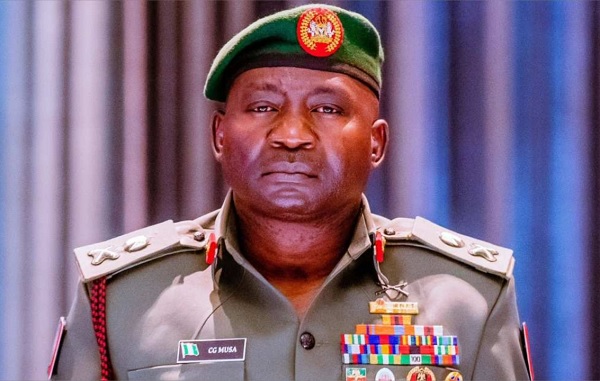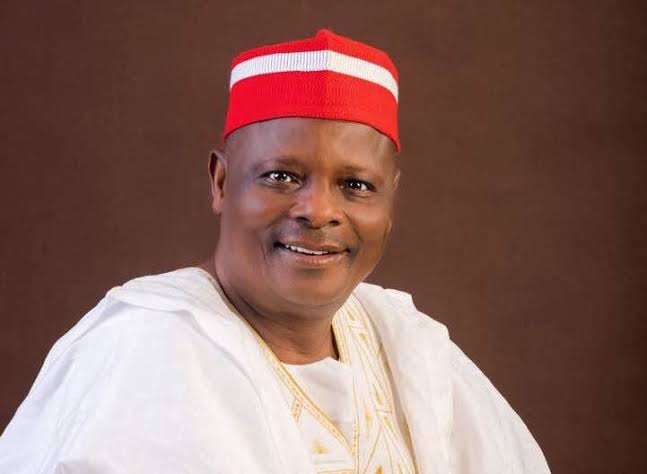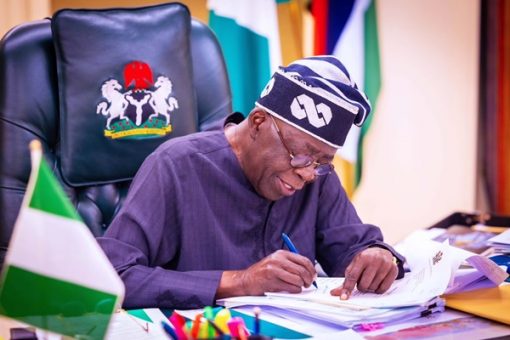News
Poverty, Hunger Fueling National Security Crises, Says CDS

The Chief of Defence Staff (CDS), Gen. Christopher Musa, has warned that poverty and hunger have escalated beyond social issues, now posing serious threats to Nigeria’s national security.
Speaking at the opening of the 14th National Security Seminar in Abuja on Monday, Gen. Musa, represented by the Chief of Defence Training, Rear Admiral Ibrahim Shetimma, stressed that insecurity in the modern world is no longer solely defined by armed conflict, but also by widespread economic hardship, food insecurity, and social dislocation.
The seminar, themed “Combating Hunger and Poverty for Sustainable Peace and Development in Nigeria,” was organised by the Alumni Association of the National Defence College (AANDEC) in collaboration with the Office of the National Security Adviser (ONSA).
National Security Adviser (NSA), Mallam Nuhu Ribadu, said the administration of President Bola Ahmed Tinubu is actively working to break the cycle of poverty and insecurity through key initiatives such as agricultural reforms, expanded social investment programmes, and targeted security interventions.
“There is a clear link between poverty and insecurity, which feeds a vicious cycle that stifles economic growth and worsens social vulnerabilities. Hunger and deprivation are not just humanitarian concerns; they are drivers of crime, violence, and national instability,” Ribadu said.
Minister of Defence, Muhammad Badaru, echoed the need for a people-centred approach to security. He called for targeted solutions that address the root causes of insecurity, including unemployment, poverty, and social exclusion.
Badaru emphasised the need for collective action, noting that Nigeria’s security challenges transcend borders and require broad collaboration.
The speakers unanimously agreed on the urgent need for a coordinated national response to economic hardship, warning that without deliberate intervention, hunger and poverty could continue to fuel unrest and weaken the country’s social fabric.
He said, “Insecurity today is not only defined by weapons but also by economic deprivation, food insecurity, and social dislocation. Hunger and poverty are no longer mere social challenges – they have become national security threats.
“The North Central region, particularly Benue State, once considered Nigeria’s food basket, is a clear example of how banditry, displacement, and farmer-herder conflicts have devastated agricultural productivity.”
Musa noted that the disruption of farming communities and illegal occupation of farmlands contributed to food inflation, displacement, and mass migration, thereby destabilising both the economy and national cohesion.
He called on communities to deny criminals and terrorists sanctuary by supporting intelligence gathering, timely reporting, and community vigilance.
The CDS called for urgent investment in grassroots agricultural development.
He urged the government and stakeholders to reposition farming as a noble and rewarding profession by enhancing access to credit, infrastructure, and market linkages.
He said: “With the migration of rural youth to urban centres, agricultural productivity is declining.
“We must make farming attractive again, not as a last resort, but as a national duty and a prestigious calling,’’ he added.
Musa also praised President Bola Tinubu’s Renewed Hope Agenda, particularly its emphasis on financial autonomy for local governments, which he described as vital for responsive and community-driven development.
“I assure you, the Armed Forces of Nigeria, in synergy with other security agencies and with the support of the people, remain resolute in overcoming all security threats,” he said.
“We must build a Nigeria where every citizen can live in peace, engage in productive livelihood, and enjoy the dividends of democracy.”
He commended the organisers for creating a strategic platform for critical dialogue on Nigeria’s security and developmental challenges.
Tinubu prioritises agric reform to end poverty – Ribadu
Represented by the Director of Defence Affairs at ONSA, Maj.-Gen. Peter Mala, Ribadu said that national security is a collective responsibility that demands a multidimensional and collaborative approach.
According to the NSA, there is a vicious cycle between poverty and insecurity, which hinders economic growth and exacerbates social vulnerabilities.
He said: “The Federal Government under President Tinubu has prioritised agricultural reforms, social investment programmes, and security sector interventions aimed at breaking this cycle.
“These efforts are visible through increased support for food security initiatives, enhanced law enforcement capacity, and infrastructure to support agricultural production and distribution.”
The NSA said that his office had continued to coordinate both kinetic and non-kinetic efforts across the armed forces, intelligence services, security agencies, and relevant government and non-governmental actors.
He said in spite of the progress made, issues like unemployment, hunger, and youth disenfranchisement remain persistent and require deeper, long-term solutions.
According to Ribadu, the seminar presents an excellent platform for collective introspection and the sharing of ideas towards tackling the dynamic and multifaceted challenges confronting the nation.
He commended AANDEC for its commitment to national development and bringing together leaders of thought, security experts, policymakers, and citizens to chart a path forward.
…’Whole-of-society’’ approach key to end poverty – Badaru
Badaru said that only a “whole-of-society” approach could tackle pressing issues like hunger, poverty, and violence.
He commended President Bola Tinubu’s commitment to improving the quality of life for all Nigerians and praised the Armed Forces and security agencies for their bravery and innovation in responding to security threats.
Badaru said the seminar served as a platform for stakeholders to deliberate on sustainable solutions, foster dialogue, and promote inclusive approaches to national security.
He expressed confidence in the collective efforts of Nigerians to build a secure and prosperous future, where peace and stability reign supreme.
Badaru said the Defence Ministry remains committed to supporting innovative and inclusive approaches to national security.
“May our collective efforts continue to strengthen our path towards unity, resilience, and sustainable national security,” he said.
The President of AANDEC, retired Air Commodore Darlington Abdullahi, underscored the need for sustained investment in education, economic empowerment, and social inclusion as critical non-kinetic responses to Nigeria’s deepening
Abdullahi said that hunger and poverty were not just humanitarian crises but strategic threats to national stability.
He stressed that neglecting the socio-economic well-being of the population creates fertile ground for instability and extremism.
Abdullahi said, “When millions suffer from hunger and poverty, they become vulnerable to exploitation by those with ill intentions.
“We must therefore invest in our people, especially in education, livelihoods, and skills development.”
“Economic initiatives that foster inclusion and bring communities together can be effective tools for peacebuilding, as they create an atmosphere of stability and discourage violence.”
He advocated for the creation of a dedicated vocational and leadership development centre for widows and children of fallen heroes, describing it as a necessary step in empowering vulnerable populations and promoting national healing.
Thenationonlineng.net
News
BREAKING: Winner Emerges In Kano Bye-Election As APC, NNPP Lock Horns

The All Progressives Congress (APC) has emerged winner of the Ghari/Tsanyawa supplementary election in Kano state
The returning officer, Professor Muhammad Waziri of Bayero University, declared Garba Ya’u Gwarmai of the APC winner with 31,472 votes
Waziri defeated the candidate of the New Nigeria Peoples Party (NNPP), Yusuf Ali Maigado, who polled 27,931 votes


The All Progressives Congress (APC) has secured victory in the Ghari/Tsanyawa supplementary election held in Kano state.
Announcing the results on Sunday morning, August 17, the returning officer (RO), Professor Muhammad Waziri from Bayero University, declared APC candidate Garba Gwarmai the winner with a total of 31,472 votes.
He defeated the candidate of the New Nigeria Peoples Party (NNPP), Yusuf Maigado, who polled 27,931 votes, according to The Punch.
The supplementary poll was conducted after the initial election in the constituency was declared inconclusive. With a margin of 3,541 votes, Gwarmai’s victory marks a key win for the APC as the party continues to reinforce its influence across the state.
Meanwhile, the NNPP won the Bagwai/Shanono state assembly by-election in Kano state.
Daily Trust and Vanguard noted this update.
Announcing the result at 12:36 a.m. on Sunday, August 17, the RO for the election, Prof. Hassan Adamu Shitu, declared the NNPP candidate, Ali Hassan Kiyawa, winner with 16,198 votes, defeating the APC candidate, Ahmad Muhammad Kadamu, who polled 5,347 votes.
News
Tinubu’s Government Lacks Effective Communication Strategy - Babangida

Former Governor of Niger State, Dr. Babangida Aliyu, has said that the administration of President Bola Tinubu is performing well but lacks an effective communication strategy to relay its achievements to Nigerians.
Aliyu made the statement on the Thursday edition of Arise Television’s ‘The Morning Show’, while reacting to the outcome of a recent public accountability session held in Kaduna.
Aliyu, reflecting on the discussions at the Kaduna Forum, said the government is facing public dissatisfaction not because it hasn’t delivered, but because it is failing to tell its own story effectively.
The ex-governor said it is proper for political leaders in the North to make demands from Tinubu’s administration since the bulk of the votes that took power came from the region.
“Let the people understand what is happening on the ground. If by what we say that 63/64 percent of the vote came from the north, it is only logical that the north will be expecting so much from the government.
“But from what we have seen so far is that the government is doing well but they do not know how to communicate very well,” he said.
News
New Twist As El-Rufai Snubs ADC, Announces Another Party To Vote In Kaduna Bye-Election [ Video Trends]

Former Kaduna governor, Nasir El-Rufai, appeared to have taken a reverse from the coalition’s adopted political platform, ADC
This is as the former governor took to social media and asked the people of Zaria, Chikun to vote for another party in the Saturday, August 16 (today), bye-elections in the constituencies in Kaduna
Recall that the former governor recently visited Sokoto to canvass support for the ADC, while criticising President Bola Tinubu and the APC government.
Click to watch El-Rufai’s video here
— Nasir Ahmad El-Rufai (@elrufai) August 14, 2025

Nasir El-Rufai, the immediate past governor of Kaduna, has fueled speculations that he dumped the recently adopted coalition political platform, African Democratic Congress (ADC), as he called on the people of Chikun/Kajuru federal constituency and Zaria Kewaye and Basawa state constituency to vote for the Social Democratic Party (SDP).
However, in a dramatic turn, the former governor urged the people of Zaria and Chikun to vote for the SDP in the Saturday, August 16, by-election, a poll which was meant to test the opposition’s strength ahead of the 2027 general election.
Recall that El-Rufai defected to the SDP after dumping the ruling All Progressives Congress (APC), but soon after joining the party, the SDP fell into a leadership crisis, and the former governor has been silent on his membership and allegations against him.
El-Rufai recently visited Sokoto on a mission to gather support for the ADC. He described his action as a patriotic one to rescue Nigeria from the grip of ‘nepotism’ and ‘incompetence’.
During his visit to Sokoto, the former governor attended two important events meant to sensitise the people and political stakeholders working to achieve the agenda of sacking President Tinubu and the APC in the next general election.
During his address at the event, the former governor lambasted the ruling party and called them ‘a failed, clannish, and visionless administration that has plunged Nigeria into deeper socio-economic misery’.
He declared that it was time for Nigerians to rise against the APC and accused the party of ‘broken promises and elite conspiracy’. He warned that any move to vote for the APC beyond 2027 would be a greater doom for the country.
However, in a sharp turn, the former governor, in a video posted on his social media page ahead of the by-election, urged the people in the constituencies where the poll will be held in Kaduna on Saturday, August 16, to vote for the SDP rather than the ADC he went to Sokoto to canvass for.
-

 Lifestyle2 weeks ago
Lifestyle2 weeks agoJAPA TO HELL: ‘I Sold My Father’s House For ₦45Million To Relocate To Canada Because Of Bad Government, One Year After I’m Still Jobless’
-

 News1 week ago
News1 week ago2027 Election: Work Against North If Obi Can’t Become President, Archbishop Tells Igbos
-

 News2 weeks ago
News2 weeks agoWinner Emerges As AI Predicts 2027 Presidential Election Between Tinubu, Obi, Atiku (See Result)
-

 Lifestyle2 weeks ago
Lifestyle2 weeks ago4 Wives, 300 Cars, 38 Private Jets And Gold Boats: Meet The Richest King In The World
-

 News1 week ago
News1 week ago2027 SHOCKER! New Prophecy Reveals On Peter Obi’s Joint Ticket With Atiku
-

 Politics1 week ago
Politics1 week agoPrimate Ayodele’s Prophecy On Jonathan’s Running Mate For 2027 Election Resurface
-

 News1 week ago
News1 week ago2027 Election: Jonathan, Peter Obi Deal Revealed
-

 Lifestyle6 days ago
Lifestyle6 days agoVIDEO: Mixed Reactions As Pastor Abel Damina Drops BOMBSHELL On Marrying Two Wives As Christian





